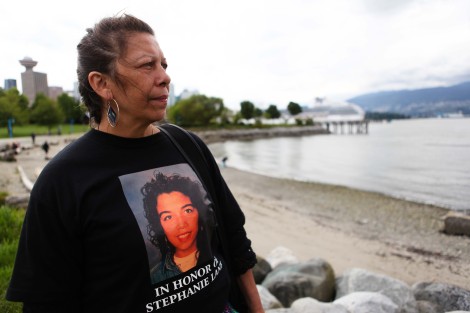Published in Windspeaker newspaper | January 2013 | Circulation: 145,000

Hundreds of women flooded into Commissioner Wally Oppal’s speech following the release of the missing women inquiry report, drumming, singing and heckling. Photo by David P. Ball
The release of Wally Oppal’s scathing final report from B.C.’s missing women inquiry was met with sobbing, drumming, and anger on Dec. 17 as families and friends began the next stage of grieving for their lost ones, and rights groups rallied around the call for a Canada-wide investigation.
The commissioner concluded more than a year of testimony, reports and controversy, ruling that “systemic bias” by RCMP and Vancouver police had repeatedly “forsaken” dozens of missing Native women.
In response, B.C. Attorney General Shirley Bond appointed former Lt. Gov. and former Stó:lo Nation chair Steven Point to “champion” Oppal’s recommendations.
But with more than 600 missing and murdered Native women documented countrywide, (some speculate that number might be as high as 2,000) rights groups are pressing on with demands for a national inquiry.
“This inquiry dealt only with the failure of police around Vancouver to investigate and prosecute William Pickton in a timely way,” said Michèle Audette, president of the Native Women’s Association of Canada. “The Oppal inquiry did not deal with all of the murders and disappearances of Aboriginal women and girls even in the province of British Columbia, and the murders and disappearances have continued.
“The Oppal inquiry did not focus specifically on Aboriginal women and girls, and the multiple factors which cause the epidemic of extreme violence against them. Because of this limitation, we need a national public inquiry that is focused on the murders and disappearances of Aboriginal women and girls in every part of Canada, which will deal with the systemic patterns and causes of the violence.”
Oppal’s report also concluded that police could have caught serial killer Robert “Willy” Pickton five years before his arrest, if charges had not been mysteriously dropped in the pig farmer’s attempted murder of a sex trade worker known as “Ms. Anderson” in 1997. He later confessed to killing 49 women, at least 19 of whom disappeared after 1997.
That was also the year that Stephanie Lane, a 20-year-old Métis woman, disappeared, only to have her DNA discovered on Pickton’s farm after his arrest. Lane’s mother, Michele Pineault, was 38 at the time, just a year older than her daughter would have been if she were alive today.
“There is no healing,” Pineault told Windspeaker. “We’re broken families.
“I’ve lived through a huge portion of my life without my daughter. It seems like sometimes I never even had a daughter, because it’s been so long.”
For Pineault, Oppal’s refusal to hear from a number of key police and Pickton farm witnesses, requested by Cameron Ward, lawyer for her and other families, or allow any discussion of widespread cover-up allegations against the police meant the final report’s release brought no closure or healing.

